‘I said what I needed to say’
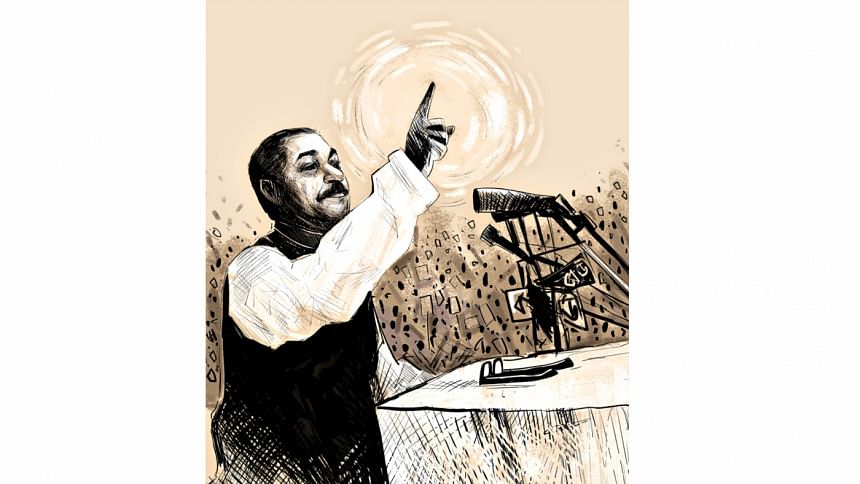
After delivering his watershed speech on March 7, Bangabandhu Sheikh Mujibur Rahman returned home with thousands in his wake.
He knew very well the consequences the speech could have.
During dinner with his family that night, he said, on a rather sombre note, "I said what I needed to say at today's rally. The government can now arrest me or kill me at any time. That is why from today, you will have meals with me twice a day."
Scientist MA Wazed Miah, in his book "Bangabandhu Sheikh Mujib Ke Ghire Kichhu Ghotona O Bangladesh", wrote that from that day, the family members complied with his wish until March 25 afternoon.
"Bangabandhu was busy talking to the leaders of Awami League, Chhatra League, Krishak League, Sramik League, Jubo League and other organisations on the ground floor of the house till 11:00pm [March 25]. We all except my mother-in-law [Sheikh Fazilatunnesa Mujib] had supper," he wrote.
On that fateful night, Bangabandhu was arrested and later taken to Pakistan where he was kept in solitary confinement.
On March 7, Wazed and his wife -- Bangabandhu's eldest daughter Sheikh Hasina -- were staying at the house.
He described in his book how Bangabandhu spent the day.
It was the first Sunday of a fiery March and Bangalees were aching to join a rally to be addressed by Bangabandhu who was leading a massive non-cooperation movement at that time.
Bangabandhu's Dhanmondi-32 home was packed with leaders and activists of the Awami League and others since the morning of March 7.
Bangabandhu sat for a closed-door meeting with AL leaders Syed Nazrul Islam, Tajuddin Ahmad, M Mansur Ali, AHM Qamaruzzaman, Khandaker Mushtaque Ahmed, and Dr Kamal Hossain in the library, Wazed wrote.
After a long discussion, he came out and said they have reached a consensus, and a four-point declaration would be made at the rally in the afternoon.
He said the declaration would be made in the light of the prevailing political situation and the demands of the students and people.
After giving the necessary instructions, Bangabandhu went upstairs to have a shower and lunch. After his meal, when he was resting, Dr Kamal Hossain went up to him and showed him a draft of the declaration.
In his book "Bangladesh: Quest for Freedom and Justice", Dr Kamal said he was asked to prepare the draft of a press statement embodying the position taken.
The statement would be released to the press after the rally. The statement would demand an end to martial law and the transfer of power to elected representatives of the people, among others.
Bangabandhu directed that Tajuddin would be in charge of the statement and that he would make any amendments necessary in the light of the speech delivered before personally issuing it to the press.
WHAT WOULD BANGABANDHU SAY?
The question was being asked everywhere. Would Bangabandhu, the leader of the party that emerged from the recently held national election with a thumping majority, declare independence during his March 7 speech?
Protesting the postponement of parliament going into session, Bangabandhu was leading a massive non-cooperation movement from the beginning of March 1971. Millions took to the streets defying the indiscriminate firing of the Pakistani regime.
Bangalees were ready for independence and to free the country from the clutches of the Pakistanis. The situation soon went beyond the point of no return.
Pakistanis secretly brought in more troops.
It had been known since March 1 that Bangabandhu would outline the future course of action at a rally on March 7. Subsequently, it was announced that President Yahya Khan would address the nation on March 6, wrote Archer K Blood, then US consul general of erstwhile East Pakistan in 1971 in his book "The Cruel Birth of Bangladesh: Memoirs of an American Diplomat".
"This coming conjunction gave rise to much anxiety, hope and speculation in East Pakistan. The key question debated was whether or not Mujib would use the occasion to declare the independence of Bangladesh, and, if so, how would the army react," he added.
There were intense speculations as to what would be said and everyone had their eyes fixated on Awami League President Bangabandhu Sheikh Mujibur Rahman, the de facto leader after being denied power by the then Pakistani rulers.
THE RALLY
Wazed Miah said Bangabandhu accompanied by AL leaders got on a truck to go to the Ramna Race Course, now Suhrawardy Udyan. A boat-shaped stage was built there. The crowd greeted him chanting slogans at the top of their lungs.
But there was a hush as soon as Bangabandhu stood up to deliver his speech. Emotion-choked, Bangabandhu, one of the greatest orators, started by saying, "I have come before you today with a heart laden with sadness… ."
In his 19-minute speech, he described how Bangalees were denied their democratic rights even after getting the majority in the election.
Bangla desires emancipation. He ordered people from all walks of life to prepare for armed struggle against the tyranny, exploitation, subjugation and deprivation by the Pakistani military junta with whatever they had and transform every house into a fortress.
He also gave a complete guideline on how the country would be run.
Then comes the masterstroke of Bangabandhu and the final announcement with his thunderous voice: "The struggle this time is a struggle for emancipation. The struggle this time is a struggle for independence. Joy Bangla."
The crowd listened to him in almost complete silence and took in what Bangabandhu had asked them to do. The people in the gathering raised their hands in unison to express their solidarity with the call.
The speech inspired people to prepare for the Liberation War that eventually began after the Pakistani regime on the night of March 25 launched an attack on unarmed Bangalees and unleashed a genocide that continued for the next nine months.
"Mujib's speech on Sunday March 7 was more notable for what he did not say than for what he actually said," Blood wrote.
After Bangabandhu returned home, officials and staffers of Dhaka centre of Radio Pakistan came to see him around 8:00pm.
They informed Bangabandhu that despite the prior approval of the authorities concerned, the high command of the Pakistan army in Dhaka did not allow the speech to be broadcast live that day.
And as a protest, they went on an indefinite strike until they were allowed to broadcast his entire speech.

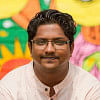
 For all latest news, follow The Daily Star's Google News channel.
For all latest news, follow The Daily Star's Google News channel. 

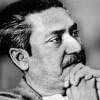

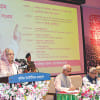
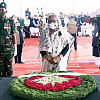



Comments